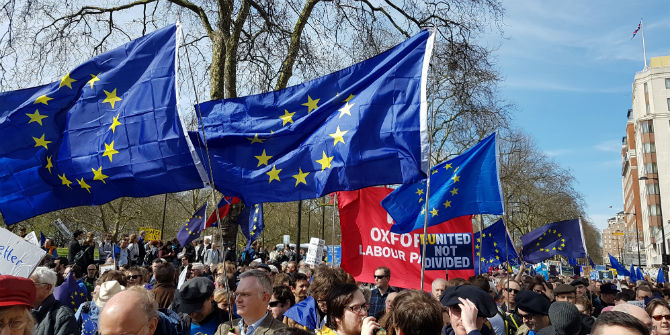 Among the groups campaigning against a hard Brexit, Open Britain is among the best-resourced. But their impact on public opinion and the government’s negotiating stance has so far been minimal. LSE Brexit co-editor Ros Taylor asked the chair of Open Britain, Roland Rudd, about the campaign’s strategy.
Among the groups campaigning against a hard Brexit, Open Britain is among the best-resourced. But their impact on public opinion and the government’s negotiating stance has so far been minimal. LSE Brexit co-editor Ros Taylor asked the chair of Open Britain, Roland Rudd, about the campaign’s strategy.It’s March 2019 and we’ve just crashed out of the EU without a trade or transitional deal. What happens next?
This would be the worst possible outcome for our economy, whatever Boris Johnson might say. There would be a number of very serious consequences. We would face tariffs on all our exports to Europe, from 10% on cars and 12% on clothing to very high rate on agricultural produce – for example 40% on lamb. Exporters and importers would also face customs checks and rules of origin compliance, both of which are costly and time-consuming. Businesses in the services sector would lose the right in many cases to operate in Europe on the same terms as they do now – for example, the loss of passporting rights for the City of London. The cumulative impact of this would be devastating for trading businesses, and that would mean less trade and fewer jobs.
There’s little evidence voters are changing their minds about Brexit. What will it take for the public mood to change?
The real Brexit process has yet to begin, so it is unsurprising that there has not been a major shift in public opinion. But exclusive polling carried out for Open Britain has shown that a majority of Leave voters are not willing to become a penny worse off as a result of Brexit, or as a result of reductions in immigration. We have also set out the ten major promises made by the Government for which they must be held to account. So as the process begins in earnest, it is plausible that the public mood could change as people see the damage to our economy the Government’s hard Brexit path will cause, and how far away the reality is from the rhetoric.

We know the public generally want to stay in the Single Market, or enjoy the same access to it as they do now, but a majority still want an end to freedom of movement. Will they get it?
One of the biggest mistakes the Government has made was to give up on continuing membership of the Single Market before negotiations had even begun. Open Britain’s position has always been that, as the second-largest economy in Europe, there is a real prospect that we could achieve continued membership of the Single Market while reforming the way our immigration system works. But as a result of the choices the Prime Minister has made, unless they change course we will never know the answer to that question.
We saw a bigger turnout than expected at the pro-EU march on 25 March, despite organisational hitches – up to 100,000 people. Do you think demos like this have a role to play in opposing a hard Brexit?
They undoubtedly have an important place. It’s good that people who voted to Remain, who value our relationship with Europe, are showing so strongly that they are passionate and well-supported, and not the metropolitan elite of the Brexiteers’ imagination.
The main opposition to Brexit in Parliament has come from the veteran Tories Michael Heseltine and Ken Clarke. Do you hold out much hope that parliamentarians will oppose a hard Brexit?
We are working together with MPs from all parties to try to oppose a hard Brexit. In the week that Article 50 was triggered, we brought together Nicky Morgan from the Conservatives, Chris Leslie from Labour and Nick Clegg from the Liberal Democrats to present our document on where the Government needs to be held to account. It was disappointing that Parliament did not support the amendment to the Article 50 Bill which would have given MPs a meaningful vote at the end of the process, but around 10 Conservative MPs abstained. Parliament will have a continuing role to play, both in scrutinising and eventually approving the negotiations, and it’s clear MPs from all parties are not going to simply roll over if they disagree with the Government’s course.
What most worries you about the direction of travel the government has taken?
There have been a number of worrying aspects to the Government’s approach so far. The refusal to grant the automatic right to remain for EU citizens has been very disappointing – they are human beings, not bargaining chips. The support for a “no-deal” Brexit from the Foreign Secretary is deeply concerning, as all the evidence suggests it would be the worst possible outcome for Britain. The refusal to even fight for Single Market membership is also mistaken. However, we have recently seen a potentially more conciliatory tone from the Prime Minister, both on transition and on immigration, which is welcome and should be encouraged.
This post represents the views of the authors and not those of the Brexit blog, nor the LSE.
Roland Rudd (@RolandRudd) is chairman of Open Britain and the public relations firm Finsbury and a visiting fellow at the Said Business School, Oxford University.
Ros Taylor is co-editor of LSE Brexit and editor of Democratic Audit.







All canfdidates should be asked if they will support another referendum on whether or not the terms are acceptable, once the negotiations with the EU on the deal and future trading with the EU, are known.
The decision to be taken folowing the referendum, on whether to accept the terms negotiated or not.. The options to remain in membership of the EU or in the European Economic Zone, to be included in the referendum